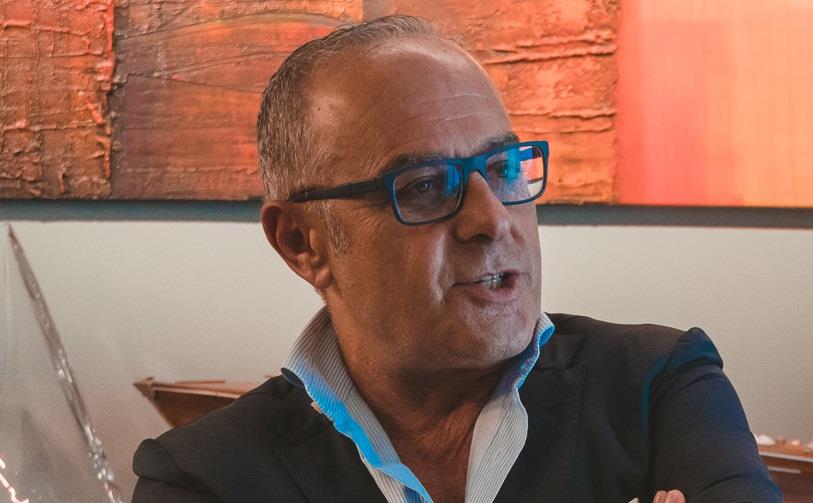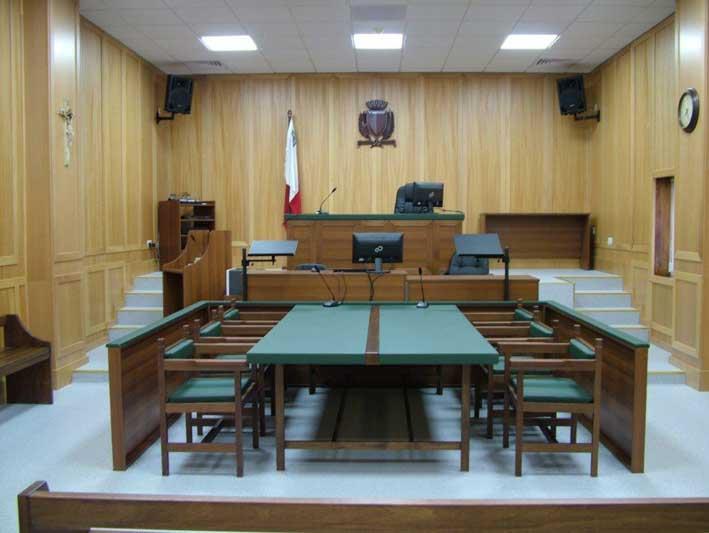The Chamber of Advocates was 'kept in the dark' by the government when it introduced the Bill to regulate the Legal Profession, the President and Secretary General of the Chamber said, adding that what is contained in the Bill is very different to what they thought was agreed upon with the government during consultation.
The Chamber of Advocates has been calling for the regulation of the profession through the introduction of what it calls a Lawyer's Act since 2008, the Chamber's representatives told this newsroom. They explained that what the Bill presented in Parliament proposes is far less regulation than the Chamber would like, and also includes elements of ambiguity which could cause problems down the line.
Chamber President Louis de Gabriele and Secretary General Stefan Camilleri sat down with The Malta Independent to discuss their views about the Bill, and how it is different from what the Chamber actually wanted. They immediately described the Bill as being "not fit for purpose."

Among the issues highlighted by the Chamber was one that revolves around a particular phrase. The current Bill will add on a requirement to the Code of Organization and Civil Procedure, reading that no person will be able to obtain a Warrant to practice as a lawyer unless they are a 'fit and proper person as recommended by the Committee for Advocates and Legal Procurators'.
"The Bill does not provide any definition of what 'fit and proper' means, nor does the Bill provide the required powers for the regulator to adopt rules that would clarify the concept and therefore provide certainty." The idea of the 'fit and proper' requirement, both de Gabriele and Camilleri said, was included in the Chamber's original proposals for the Lawyer's Act, but while the term made its way to the final Bill, the clause defining that term did not. "To me, this is now just window dressing, it is like throwing the term there because it sounds good but means very little," Chamber President de Gabriele explains. "You may be able to get an idea of what it should mean in the general context, but without a legal definition it opens the way to significant subjectivity, thus reducing certainty and consistency of application."
"Laws are not meant to leave such a wide subjectivity of judgement. Laws are there to provide certainty. For example, if someone applies for a Warrant that person would want to know, clearly, what the requirements are. People would ask themselves 'am I fit and proper? Do I qualify as a fit and proper person?' If that person has no idea what the criteria against which he or she is going to be judged are, then he or she will not have the certainty in terms of whether or not they are eligible."
The President and the Secretary General described the events leading up to the presentation of the Bill.
The Chamber had gone to the previous Justice Minister - Owen Bonnici at the time - with its own views of how the profession should be regulated, through a two-tiered system. "Our proposal would have resulted in a significant enhancement in terms of self-regulation, as the Chamber would have had day-to-day regulatory powers, but at the same time would itself also be closely regulated. In our proposal to the government, we had suggested including regulatory limitations on the Chamber, and that the Commission for the Administration of Justice would act as the Chamber's supervisor to ensure that the Chamber acted within the parameters of the law regulating it. This, for us, would have been the ideal architecture for a regulatory environment within which the profession can grow, but at the same time would ensure the adoption of standards that would safeguard the public interest," de Gabriele said.

The Chamber, he adds, believes that the current code of ethics has withstood the test of time as a codification of ethical principles dictating the conduct of advocates. On its own this is, however, not enough. "Given the changes the profession has witnessed over the years, it is important that these high level principles are properly supported by guidance and professional rules that have legal force behind them." President de Gabriele also explained that the Chamber envisages a role for itself in terms of actively participating in a process of the requirements for the Warrant exam for example. "If someone wants to belong to a profession, then in principle it should be the profession itself that admits that person to it. We fully acknowledge that this has not been the culture thus far, so we did not propose such far reaching amendments to the system as setting the warrant exam, but we said that we, at least, wanted to be a part of that process."
He said that the Chamber's proposal would have regulated the profession from the student phase, in terms of the training necessary to render a candidate eligible to sit for the Warrant exam, all the way through to actually working within the profession and how one conducts themselves in the profession.
"It would have regulated how EU lawyers could practice in Malta; as well as how the required one-year training in a legal office prospective lawyers require before achieving their Warrant is meant to take place for example," Camilleri added. On this latter point, de Gabriele highlighted that the Chamber wants to further define who is entitled to provide that training. "So someone who became a lawyer one year ago can train others... it is absolutely not right, and in our proposal we had said that any lawyer wanting to train prospective lawyers must have five year's practising experience in the profession and would be able to take on no more than two such prospective professionals. We want this to make sense - we want to ensure that whoever is training young professionals has enough experience to do so, but also that the trainer has sufficient time to be able to dedicate."

Another thing the Chamber wanted included was a continuous professional development requirement. "You cannot have a profession in the 21st century where laws are being issued by Brussels on an ongoing basis and where laws change all the time and not have a continuous professional development requirement. I became a lawyer 32 years ago, if I didn't take interest in updating myself with new and revised laws, how would I operate?"
After having submitted its proposals to the government, the government went back to the Chamber with a different proposed draft. "Essentially, the government was not happy in giving the Chamber the power to regulate the profession on a day-to-day basis, and proposed the setting up of an Advocate's Regulatory Board, which would have been a separate entity on which the Chamber would have been represented," the Chamber's President explains. The Board was to have regulatory powers, he adds.
Under that version of the government's proposal, de Gabriele said, the Chamber would still have had its voice in the regulatory environment, and was to exercise regulatory powers on how new lawyers are introduced into the profession - regarding their training period (Prattika), for instance.
"After government's changes, we provided our feedback to them, in terms of what we thought would be a workable solution, although not our ideal position, it would have reflected the government's objectives but at the same time would have allowed the Chamber an influential say in the profession."
The Chamber was under the impression that some form of middle ground was reached, de Gabriele explained. The Bill presented in Parliament, he said, is neither the one the Chamber originally proposed, nor the one the government had come back to them with, but rather something different which is, as he described it, not up to standard and fails to achieve the objective of properly regulating the profession.
The Chamber, both de Gabriele and Camilleri said, were left completely in the dark as to why the government made these changes, and was also left in the dark in terms of why a number of proposals the Chamber wanted included are completely absent. The Chamber has on numerous occasions sought to understand what in their proposals or the first set of Government's own proposals were a stumbling block, but it remains in the dark, they said. The Chamber is unable to understand why a number of its proposals were left out and, unless they can understand the problem, they can hardly propose new workable solutions that could possibly satisfy the government's concerns, de Gabriele added. Regardless of this, the Chamber, he said, has tried to provide feedback all the way.
He explained that the Advocate's Regulatory Board never made it to the final Bill. "The government opted to use the Committee for Advocates and Legal Procurators and change its composition instead, which to a certain extent can make sense to use a structure that already exists instead of creating a new one. It would have been fine to use the existing Committee if the terms of reference that was proposed for the Advocates Regulatory Board was going to be shifted and transposed into it, thus meaning that the Committee would have the powers and terms of reference of a regulatory body. This, however, did not happen."
The current terms of reference and powers of the committee, de Gabriele said, make it just essentially a disciplinary board for lawyers and legal procurators who are investigated for breaching the Code of Ethics. It does not have any regulatory powers. The only real power the Bill before Parliament will add, will just give the Committee the ability to recommend to the President who does and does not receive a Warrant. "No other regulatory powers whatsoever." The Bill, he adds, also did not give the committee any powers to define what the term 'fit and proper' means.
The Chamber President also mentioned another issue regarding the funding for the Committee. "The reality is that unless these bodies are also given the necessary resources to work, then they won't work well. If that committee wants to buy a microphone to hear witnesses in disciplinary proceedings, it does not have the budget to buy that equipment. This is crucial. Unless the powers that be provide the right level of resources, whether human resources or financial, we could have a law that on paper seems great, but it won't work in practice. So this also needs to be addressed."
"What Moneyval is after is effective regulation. What I've just mentioned - no resources, no real regulatory powers at law for this Committee, will mean that the profession will not make the qualitative jump it needs in terms of regulation. Just by telling Moneyval that a lawyer would need to be fit and proper, without defining it, does not mean they will just tick the box and say it is ok. What will be ok is if, as the Chamber has proposed, there is effective and proper regulation of the profession across the board."
Asked about the registry that will be created, containing the names of lawyers and legal procurators with a Warrant, as well as law firms, de Gabriele said that he does not view it as a significant function, though he said it was the Chamber's idea to have one.
The President and Secretary General highlighted that the Bill before Parliament does give the committee the ability to deal with lawyers for anti-money laundering breached. However, de Gabriele also described this as just being window dressing. "There were already rules in place which read that if a lawyer was found guilty of an offence liable to imprisonment by more than one year, that lawyer's Warrant is taken away permanently. All money laundering offences have a term of imprisonment which is for more than one year, so they were already encapsulated in the law. This adds nothing."
The Chamber President highlighted that neither their continuous professional development proposal, the clauses regarding EU lawyers practising in Malta, the clauses regarding the training for prospective lawyers, nor the Chamber's role in the Warrant exam, among many other things, were included in the final Bill.
Secretary General Camilleri explained that other things the Chamber wanted in the Bill which are not present included professional indemnity insurance and limitation of liability for lawyers provided that they would have such insurance for clients. "These were proposals in our first draft, but all of this was completely removed."